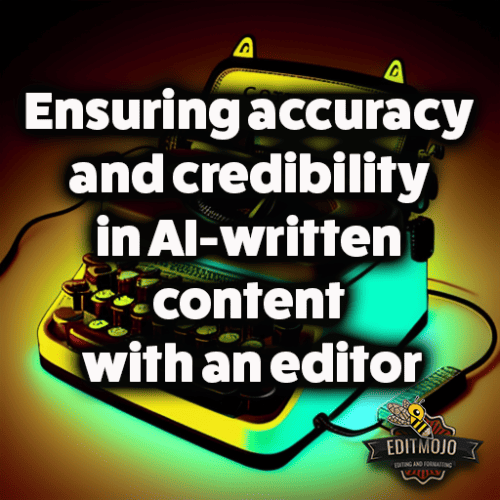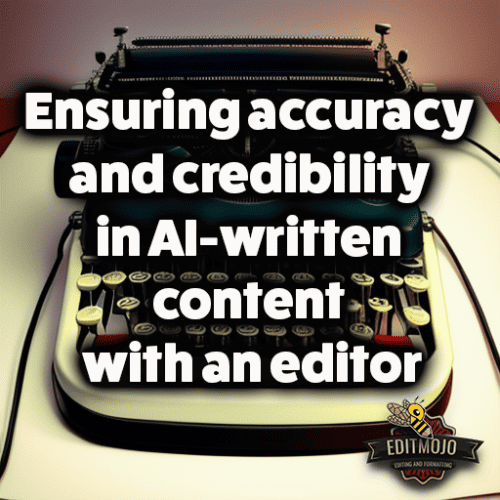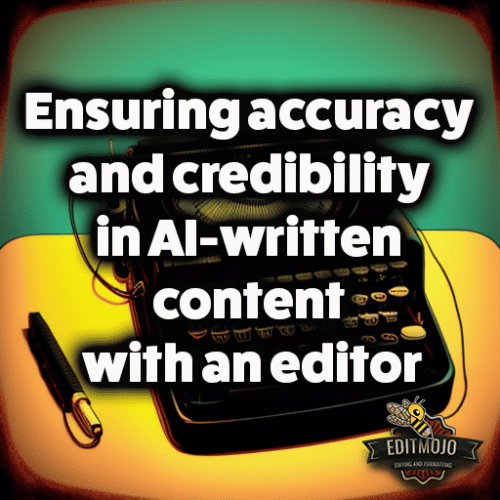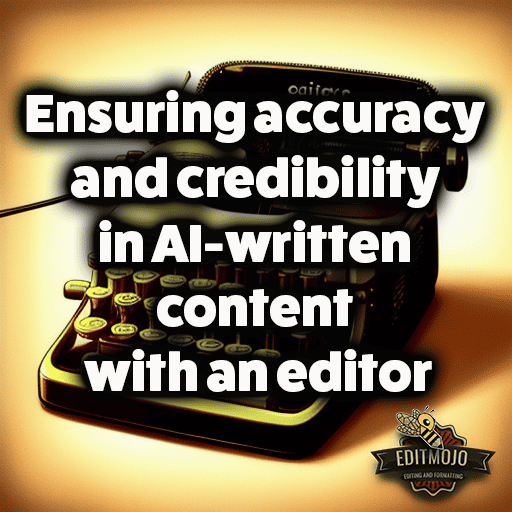Ensuring accuracy and credibility in AI-written content with an editor
Ensuring accuracy and credibility in AI-written content with an editor. In our rapidly digitizing world, one recent development stands as both an emblem of progress and a challenge: the rise of AI-written content. With the advent of advanced language models, we’re seeing artificial intelligence systems create everything from news articles to novels, emails to essays. However, as with any emerging technology, there’s an ongoing dialogue about the implications, especially regarding accuracy and credibility in AI-written content. That’s where the unassuming yet crucial role of an editor comes into play.
Key Takeaway Table
| Section | Key Takeaway |
|---|---|
| Understanding AI-Written Content | AI can generate content with speed, scalability, and consistency, but it can also produce inaccuracies due to its limitations in comprehension and contextual understanding. |
| Importance of Accuracy and Credibility in AI-Written Content | Ensuring accuracy and credibility is crucial to maintain brand trust, battle misinformation, and prevent the spread of inaccurate content. |
| The Role of an Editor in the Age of AI | Editors remain crucial in the age of AI, tasked with overseeing AI-generated content, ensuring accuracy, and training AI systems with quality data. |
| Techniques to Ensure Accuracy and Credibility in AI-Written Content | Editors ensure accuracy by fact-checking, content review and editing, cross-referencing sources, and training AI systems. |
| Case Studies: Successful Editing of AI-Written Content | Instances like The Associated Press and Automated Insights, and OpenAI’s work with ChatGPT, demonstrate the potential of a successful human-AI partnership in content creation. |
| Future of AI-Written Content and the Evolving Role of Editors | AI will play a larger role in content generation, but the need for human editors will remain, emphasizing the need for editors to equip themselves with AI knowledge and skills. |
II. Understanding AI-Written Content
A. The Concept of AI Content Generation
AI content generation involves using machine learning models trained on vast amounts of text data to create new content. The models, like GPT-3 and its successors, learn patterns and structures in human language and then generate text that mirrors these patterns[^1^].
B. The Double-Edged Sword of AI Content Generation
AI offers distinct advantages in content generation, primarily revolving around speed, scalability, and consistency. AI can generate a thousand-word article in minutes and do so with remarkable consistency[^2^]. However, these systems also have notable limitations. They can produce inaccuracies due to lack of comprehension, and their content often lacks the nuances and contextual understanding inherent in human writing.

III. Importance of Accuracy and Credibility in AI-Written Content
In our digital era, where anyone with an internet connection can be a publisher, ensuring accuracy and credibility has never been more important[^3^].
A. Accuracy: The Pillar of Trust
From a brand’s perspective, accuracy is crucial to maintain a reputation and build trust with customers. Any inaccuracies in content, especially if AI-generated, can quickly erode the credibility established over years.
B. Credibility in the Battle Against Misinformation
Credibility is essential in our fight against fake news and misinformation[^4^]. With the rise of deepfake technologies and the potential for AI systems to produce plausible but misleading content, the necessity of accurate, credible content becomes a paramount concern.
C. The Domino Effect of Inaccurate AI Content
One piece of inaccurate AI-generated content can lead to a domino effect. A misleading article, for instance, can be shared and propagated, causing unnecessary confusion or alarm. Hence, we need a system that ensures accuracy from the get-go.

IV. The Role of an Editor in the Age of AI
Traditionally, editors have been the guardians of content, ensuring everything from grammar to style and factual accuracy. In the age of AI, this role doesn’t diminish; instead, it evolves.
A. Editors: The Quality Controllers and Enhancers of AI Content
Editors are not just fixers but enhancers of AI-generated content. They add the human touch, bringing contextual understanding, nuance, and a sense of empathy that AI currently lacks.
B. The Evolving Responsibilities of Editors
Editors are now tasked with overseeing AI-written content, ensuring its accuracy, and enhancing its readability^5^. They are also responsible for training these AI systems, feeding them high-quality, updated, and reliable data.
V. Techniques to Ensure Accuracy and Credibility in AI-Written Content
Editors employ several techniques to enhance the accuracy and credibility of AI-written content.
A. Fact-Checking
Fact-checking remains a fundamental aspect of content editing, and the process becomes critical with AI content. Editors must validate every piece of data, cross-referencing it with reliable sources.
B. Content Review and Editing
Editors thoroughly review AI
-generated content for coherence and clarity. They make revisions where necessary, ensuring that the narrative flows and maintains reader engagement.
C. Cross-Referencing Sources
Cross-referencing is essential to verify the information and its origin. Editors ensure that the AI system is using trusted and accurate sources for data generation.
D. Training AI Systems
Editors play an instrumental role in training AI systems, making sure they’re equipped with updated and reliable databases. They oversee the AI’s learning, making adjustments and tweaks based on the system’s output.
VI. Case Studies: Successful Editing of AI-Written Content
There are numerous instances where editors have successfully enhanced AI-written content, demonstrating the potential for this unique partnership.
A. The Associated Press and Automated Insights
The Associated Press teamed up with Automated Insights to generate automated earnings reports[^6^]. Editors played a key role in reviewing and refining the content, ensuring both the accuracy of financial data and its presentation in an engaging, human-like manner.
B. OpenAI and ChatGPT
OpenAI’s editors work closely with their AI model, ChatGPT[^7^], overseeing its outputs and providing crucial feedback. This collaboration has resulted in improved iterations of the model, showcasing the long-term value of human-AI collaboration.

VII. Future of AI-Written Content and the Evolving Role of Editors
The role of AI in content generation is likely to expand. However, the need for human editors will remain, given their unique skills in understanding context, nuance, and the complexities of human language.
A. Preparing for the Future
To stay ahead of the curve, editors must equip themselves with knowledge about AI and machine learning[^8^]. They need to be involved in the development of these systems, guiding their training, and ensuring their outputs align with the high standards of human-written content.
VIII. Conclusion (Ensuring accuracy and credibility in AI-written content with an editor)
The rise of AI-written content is an exciting development, offering vast potential for speed, scalability, and consistency. However, the importance of accuracy and credibility cannot be overstated. As we embrace the future, the role of human editors remains as vital as ever, maintaining the quality and trustworthiness of content. The interplay between AI and human editors is not one of replacement but one of a unique partnership, a marriage of machine efficiency and human empathy.
IX. References (Ensuring accuracy and credibility in AI-written content with an editor)
[^1^]: Understanding AI Content Generation
[^2^]: AI and Content Generation
[^3^]: Importance of Accuracy in Digital Content
[^4^]: Credibility in the Fight Against Misinformation
[^6^]: AP and Automated Insights
[^7^]: OpenAI and ChatGPT
[^8^]: Editors Preparing for the Future
Top Five Questions and Answers
1. Q: Why is accuracy and credibility important in AI-written content?
A: Ensuring accuracy and credibility is crucial to maintain trust with readers, battle misinformation, and prevent the spread of inaccurate content that can harm a brand’s reputation or cause unnecessary confusion or alarm.
2. Q: How do editors ensure accuracy and credibility in AI-written content?
A: Editors employ several techniques such as fact-checking, content review and editing, cross-referencing sources, and training AI systems with updated, reliable data.
3. Q: What are some successful instances of editing AI-written content?
A: Successful instances include The Associated Press’s collaboration with Automated Insights to generate automated earnings reports and OpenAI’s work with their AI model, ChatGPT.
4. Q: How is the role of editors evolving in the age of AI?
A: The role of editors is evolving to include overseeing and improving AI-generated content, as well as training AI systems with high-quality data.
5. Q: How can editors prepare for the future of AI-written content?
A: To prepare for the future, editors need to equip themselves with knowledge about AI and machine learning. They should also be involved in the development of AI systems, guiding their training and ensuring their outputs align with the standards of human-written content.
